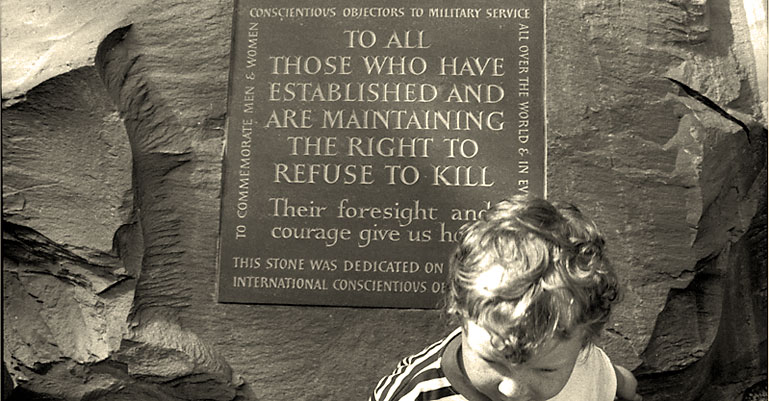
 |
 |
| Conscientious objection stone Tavistock Sq London |
| Walter Wright's story | |
Walter was a civil servant working for Customs & Excise. In 1940 his office was evacuated from London to Blackpool. Here he volunteered to join the Auxiliary Fire Service, soon to become the National Fire Service. 'The only satisfactory thing was to make up your own mind what you'd be prepared to do, and stick to that. If I was diverted to do anything else, then I felt I was becoming party to the war. I'd go into the fire service full-time if I was wanted, but that was as far as I was willing to go.' Walter's tribunal, when it came, registered him for non-combatant military duties, so he appealed. His appeal tribunal recommended that his non-combatant work should be in the fire service. Walter was lucky: he found work straight away as fireman in a small town near Blackpool. He was the only CO in the team. 'My tribunal was announced in the Blackpool evening paper which had a very anti-CO attitude. My landlady where I had lodgings had a son in the police and he was about to be called up. She told me she was very sorry, but he'd said he wouldn't come home if I was there, and asked me to leave. Wherever I went to ask if they would give me lodgings, I made it clear I was a CO, and a number turned me down right away. One man said he didn't agree with my views but I could stay there if I didn't preach pacifism to them. But his son was in the army, and when he came home on leave he said he couldn't sit at the table with me there. So I had to move on.' Later Walter joined a fire-fighting team in Dumfries, where again he was the only CO. He got quite friendly with one of the other firemen; but the man suddenly stopped talking to him. 'I was told he'd heard I was a CO and had said "This gives us all a bad name, people will think that if you're in fire service uniform you're a conchie". But I don't remember any other hostility there.' In fact he got unexpected support. Firemen were given other tasks to do between fires, such as producing grease boxes for railway trucks. One day they were told to assist in making military aircraft parts for the local Rolls-Royce factory. 'That was going a bit far, I wasn't going to do that. The officer in charge was all right about it and gave me another job to do, and while I was doing it one of the other men came up and said "I admire you for standing out like that, I wish more of us had the courage to do it." On the whole I found people in the forces more sympathetic than the general public.' But Walter, a solitary CO, felt isolated. 'That was the hardest part of it, harder than bearing the insults and ill feeling. Also I was single and would have liked a girl friend, but nearly all the girls around were going for the soldiers and the airmen.' After the war he continued to feel isolated at Remembrance time. 'I think COs should go along with Remembrance Day activities as much as they can, in so far as the ceremonies consist of mourning the losses of life. But I jib at the idea of being "grateful" to those who "gave their lives that I may be free"! For one thing I didn't ask them to do it, would have much preferred that they didn't, and would have been prepared to take the consequences of their not doing it. No-one can really say what those consequences would have been. I've become more and more convinced that non-participation in war is the right course.' | continue |
World War Two - Britain - INDEX |
| menwhosaidno.org |